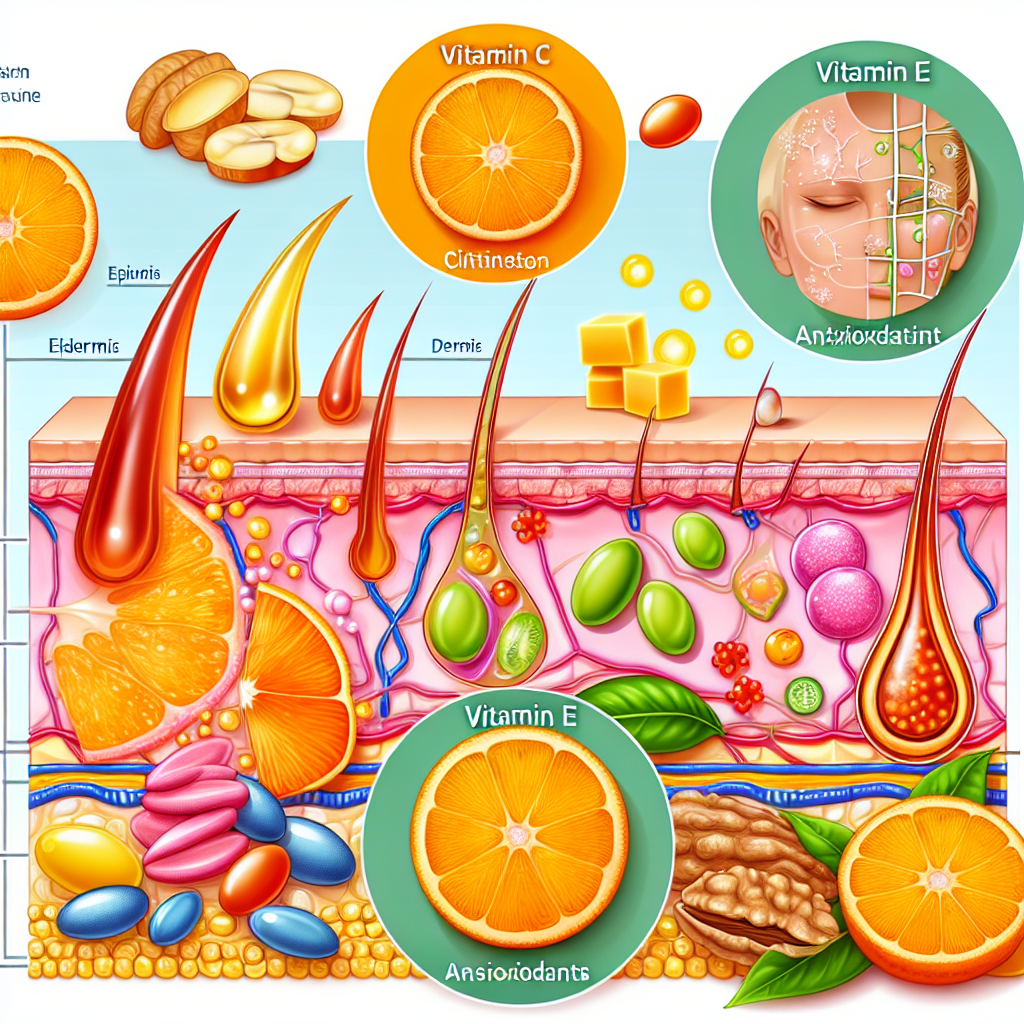How Vitamin C and E Keep Your Skin Glowing

Discover how Vitamins C and E can keep your skin glowing! Learn more about their benefits and how to incorporate them into your skincare routine. Don’t wait, start your journey to healthier, radiant skin today. Click here to find out more.
The Role of Vitamin C and E in Achieving Radiant Skin
The quest for radiant, glowing skin is a journey that many embark on, but few truly understand the science behind achieving this coveted glow. The secret to radiant skin lies not only in the products we apply topically but also in the nutrients we consume. Among these nutrients, two vitamins stand out for their remarkable benefits to the skin: Vitamin C and Vitamin E.
Vitamin C, also known as ascorbic acid, is a water-soluble vitamin that plays a crucial role in maintaining skin health. It is a potent antioxidant that neutralizes harmful free radicals, unstable molecules that can damage the skin cells. Free radicals are produced in our bodies due to various factors such as exposure to UV rays, pollution, and smoking. Over time, the damage caused by these free radicals can lead to premature aging, including wrinkles and fine lines. By neutralizing these free radicals, Vitamin C helps to prevent this damage, thereby maintaining the skin’s youthful appearance.
Moreover, Vitamin C is essential for the production of collagen, a protein that provides structure and elasticity to the skin. As we age, our bodies produce less collagen, leading to sagging skin and the formation of wrinkles. By boosting collagen production, Vitamin C helps to keep the skin firm and supple, contributing to a youthful, radiant glow.
On the other hand, Vitamin E is a fat-soluble vitamin that is also a powerful antioxidant. It works in harmony with Vitamin C to protect the skin from damage caused by free radicals. Vitamin E is particularly effective in protecting the skin from UV damage. When applied topically, it absorbs the harmful UV rays before they can cause damage to the skin cells. This protective action helps to prevent the formation of dark spots and wrinkles that are associated with sun damage.
In addition to its antioxidant properties, Vitamin E also has moisturizing benefits. It helps to strengthen the skin’s barrier function, which keeps moisture locked in and harmful substances out. This results in hydrated, plump skin that has a natural, healthy glow.
Furthermore, Vitamin E has anti-inflammatory properties that can help to soothe and calm irritated skin. This makes it beneficial for those with sensitive or inflamed skin conditions such as eczema or rosacea.
In conclusion, the role of Vitamin C and E in achieving radiant skin cannot be overstated. These vitamins work together to protect the skin from damage, boost collagen production, and maintain skin hydration, all of which contribute to a healthy, glowing complexion. To reap these benefits, it is important to incorporate these vitamins into your skincare routine and diet. This can be done through the use of topical products containing these vitamins, as well as consuming foods rich in Vitamin C and E such as citrus fruits, berries, nuts, and seeds. By understanding the science behind skin health, you can make informed choices that will help you on your journey to achieving radiant, glowing skin.
Unlocking the Secrets of Glowing Skin: The Power of Vitamins C and E

Unlocking the secrets of glowing skin is a quest that many embark on, but few truly master. The key, as it turns out, lies not in expensive creams or invasive procedures, but in the humble realm of vitamins. Specifically, vitamins C and E have been found to possess remarkable skin-enhancing properties that can help you achieve that coveted glow.
Vitamin C, also known as ascorbic acid, is a potent antioxidant that plays a crucial role in maintaining skin health. It is essential for the synthesis of collagen, a protein that provides structure and elasticity to the skin. As we age, our skin’s natural collagen production decreases, leading to the formation of wrinkles and fine lines. By boosting collagen production, vitamin C helps to maintain skin’s youthful firmness and reduce the visible signs of aging.
Moreover, vitamin C has been shown to mitigate the damage caused by harmful ultraviolet (UV) radiation. Exposure to UV light generates free radicals, unstable molecules that can damage skin cells and accelerate the aging process. As an antioxidant, vitamin C neutralizes these free radicals, thereby protecting the skin from their harmful effects. It also helps to lighten hyperpigmentation and brown spots, evens out skin tone, and enhances skin radiance.
On the other hand, vitamin E, also known as tocopherol, is another powerful antioxidant that works in synergy with vitamin C to protect the skin from environmental stressors. It is fat-soluble, meaning it can penetrate deep into the skin layers to neutralize free radicals that are produced by exposure to UV light and pollution.
Vitamin E also has an anti-inflammatory effect on the skin. It helps to soothe and calm inflamed skin, making it particularly beneficial for those with sensitive or irritated skin. Additionally, it aids in skin repair and regeneration. It strengthens the skin barrier function, improves moisture retention, and accelerates the healing of damaged skin.
The combined use of vitamins C and E offers a potent defense against skin aging. When used together, these vitamins have a complementary effect. Vitamin C primarily protects the skin from damage at the surface level, while vitamin E penetrates deeper to provide protection at the cellular level. This dual action helps to prevent premature skin aging and promotes a healthy, radiant complexion.
However, it’s important to note that the skin’s ability to absorb these vitamins decreases with age. Therefore, topical application through skincare products can be more effective than dietary intake alone. Look for serums, creams, and lotions that contain both vitamins C and E for maximum benefit.
In conclusion, the secret to glowing skin may be as simple as incorporating vitamins C and E into your skincare routine. These powerful antioxidants protect the skin from environmental damage, boost collagen production, and improve skin tone and texture. So, if you’re on a quest for radiant skin, don’t overlook the power of these essential vitamins. They may just be the key to unlocking the glow you’ve always desired.
How Vitamins C and E Contribute to a Healthy, Glowing Complexion
Vitamin C and E are two essential nutrients that play a significant role in maintaining a healthy, glowing complexion. These vitamins are potent antioxidants that protect the skin from harmful free radicals, promote collagen production, and aid in skin repair and regeneration.
Vitamin C, also known as ascorbic acid, is a water-soluble vitamin that is crucial for the synthesis of collagen, a protein that provides structure and elasticity to the skin. As we age, our skin’s collagen production decreases, leading to wrinkles and sagging skin. By boosting collagen production, vitamin C helps to maintain the skin’s firmness and elasticity, giving it a youthful and radiant appearance.
Moreover, vitamin C is a powerful antioxidant that neutralizes harmful free radicals produced by exposure to ultraviolet (UV) radiation and environmental pollutants. Free radicals can damage the skin cells, leading to premature aging and skin diseases. By neutralizing these harmful molecules, vitamin C helps to protect the skin from damage, reducing the signs of aging and promoting a healthy, glowing complexion.
In addition to its antioxidant properties, vitamin C also has anti-inflammatory effects that can help to reduce redness and inflammation associated with conditions such as acne and rosacea. Furthermore, it can help to fade hyperpigmentation and dark spots, resulting in an even skin tone.
On the other hand, vitamin E, a fat-soluble vitamin, works synergistically with vitamin C to enhance its antioxidant effects. It is particularly effective in protecting the skin from UV radiation, one of the leading causes of skin aging and cancer. By absorbing the harmful UV rays, vitamin E prevents DNA damage and reduces the risk of skin cancer.
Vitamin E also has moisturizing properties that help to prevent dryness and flaking, keeping the skin soft and smooth. It strengthens the skin’s barrier function, reducing water loss and maintaining the skin’s hydration. This is particularly beneficial for individuals with dry or sensitive skin, as it can help to soothe irritation and reduce inflammation.
Moreover, vitamin E aids in skin repair and regeneration. It accelerates the healing of wounds and reduces the appearance of scars. It also helps to fade stretch marks and age spots, contributing to a more even and youthful complexion.
In conclusion, vitamins C and E are essential for maintaining a healthy, glowing complexion. They protect the skin from damage, promote collagen production, and aid in skin repair and regeneration. By incorporating these vitamins into your skincare routine, you can help to keep your skin looking youthful and radiant. However, it’s important to remember that while these vitamins can significantly improve your skin’s health and appearance, they are not a substitute for a balanced diet, adequate hydration, and sun protection. Always consult with a dermatologist or skincare professional before starting any new skincare regimen.